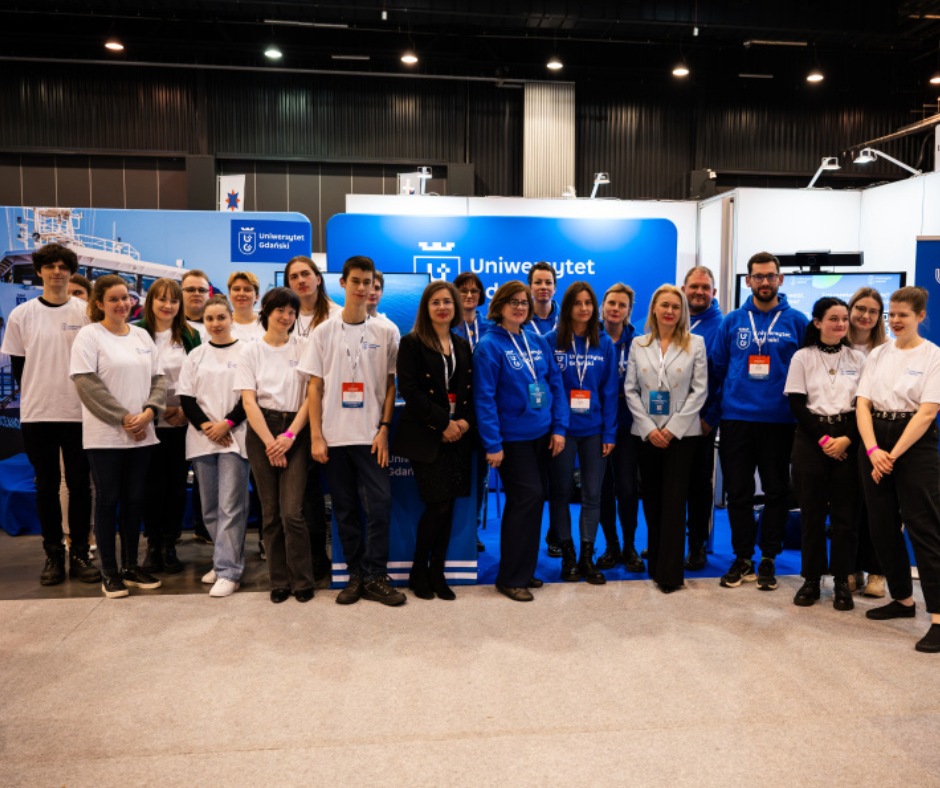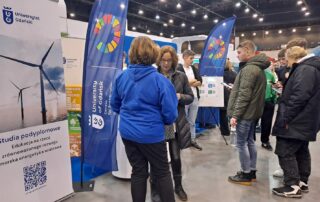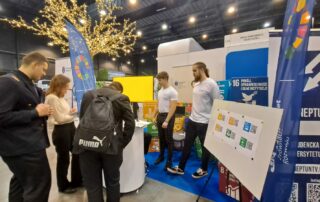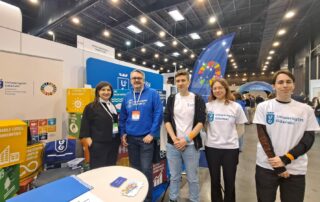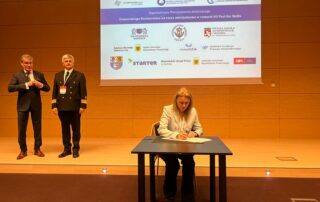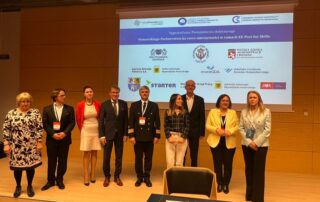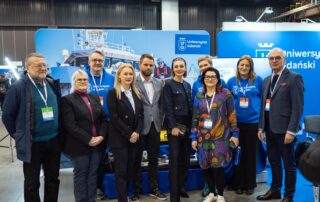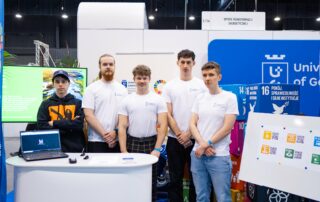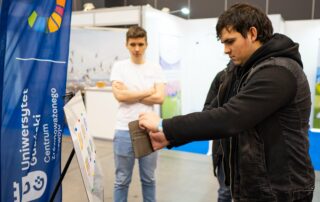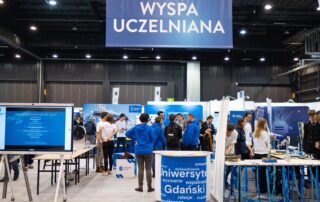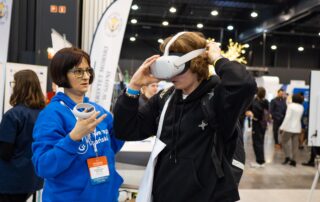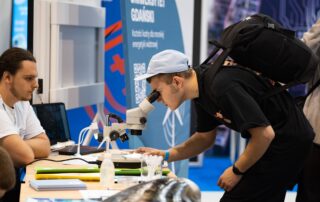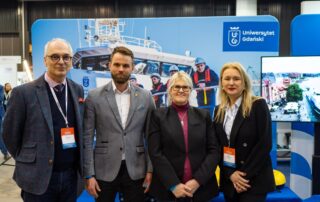More than 100 members of the UG academic community took part in the preparation of the University of Gdańsk’s exhibition at the Edu Offshore Wind Fair. Together, they created the largest exhibition among all universities. Students and staff members talked about UG’s potential in the offshore and green technology industry.
Main photo: Łukasz Bień
The Edu Offshore Wind Fair is the largest event related to personnel training in the growing offshore wind industry in Poland. The event was attended by more than 8,000 young people. It was them that representatives of UG faculties and other units and students from 12 UG scientific circles talked to about our university’s offer.
As part of our exhibition, participants in Edu Offshore Wind were able to virtually visit the University’s ship r/v Oceanograf using VR goggles, learn how energy is generated from wind, take a look at what lives in the waters of the Baltic Sea, or test their knowledge of sustainable development goals.
Diverse development paths
Green technology and offshore wind energy are interdisciplinary industries that require specialists from many fields. This diversity was evident at the University of Gdańsk’s exhibition. Over two days, students from 12 scientific circles and UG staff talked about their activities.
‘We are the largest university in Pomerania, having more than 20,000 students, so we create a divergent offer tailored to the needs of very diverse secondary school students and other people interested in studies,’ said Vice-Rector for Student Affairs and Education Quality dr hab. Arnold Kłonczyński, prof. UG. ‘Similarly, for the offshore industry itself, we offer very different educational paths related to oceanography, biology, chemistry or physics.’
To find the right course for themselves, participants were helped by applications created by the Academic Psychological Support Centre, a grup of the Faculty of Mathematics, Physics and Informatics students under the supervision of dr Jakub Neumann, prof. UG and the UG IT Centre in cooperation. The first questionnaire tested a person’s predisposition to study particular UG courses related to the offshore industry, while the second was used to examine self-esteem. After completing the questionnaire, the application presented various ways to work on increasing self-confidence.
‘We filled in predisposition tests and it came out that hydrography was the right field for both of us,’ says Maciej Nowakowski, a student of the IT technician profile class at the Polish Nobel Prize winner ‘Elektryk’ School Complex in Słupsk.
‘We did not know what this field was, so we asked an exhibitor from the University about it. It is an interesting subject. Soon, wind farms will be built on the Baltic Sea and hydrography will take measurements for their construction, among other things. Working on a ship and exploring the sea-bed is something really cool,’ adds Mateusz Bocian, a student in the same class.
‘I was very surprised by how many people completed the tests. The results made the students really happy. I think that getting to know yourself always brings a kind of satisfaction,’ says ACWP UG Director dr Agata Rudnik. ‘We were also approached by teachers because they wanted to show these applications at school.’
Not only studies
One of the main topics of conversation in the UG exhibition space was activity after classes. Students from research clubs presented initiatives related to the offshore industry, among others. Representatives of the UG student media, i.e. Neptun TV and Radio MORS, also talked about extra-curricular activities.
‘We prepared a micro-scale wind installation to show how wind energy is converted into electricity. While we can only power the lights in the garden with this model, the process itself is the same,’ says Mateusz Bednarski from the Chemistry Business Study Group. ‘Students ask whether this is indeed the future of energy, or whether another source of energy will emerge in the meantime to beat renewables.’
Conversations about renewable energy sources also took place at the UG Centre for Sustainable Development stand.
‘We prepared a quiz on the six Sustainable Development Goals, which are related to the offshore industry,’ says second-year first-year political science student Jakub Soska. ‘Students from secondary and technical schools come up, answer the questions and can win prizes. During this time, we talked about ecology, sustainable development, and why it is worth studying at UG.’
In addition, at the Centre for Sustainable Development’s stand, young people had the opportunity to take part in a survey on young people’s attitudes towards the energy transition and energy sources.
The University of Gdańsk has also prepared a general knowledge quiz. Staff and students from various faculties, units and study circles wrote several questions from a particular field. Participants answered the questions in groups to win prizes. The tests were very popular.
Except the exhibition
During the Fair, there were many initiatives related to the promotion of the offshore industry, but also the promotion of the Pomeranian region. On March 6, the Marshal of Pomeranian Voivodeship, Mieczysław Struk, announced the winners of the competition for Pomeranian Marshal’s Scholarships for the best Pomeranian students. The greatest number of awards, as many as 14, went to students from the University of Gdańsk. The laureates included students of law, ethnology, psychology, and spatial management.
The University of Gdańsk students also presented the best solutions from the maritime sector, thus winning the Baltic Challenge by Starter competition and a study trip to Brussels!
The panel discussion entitled ‘The future is now. How can social education shape leaders in the offshore sector?’ was moderated by Vice-Rector for Cooperation and Development dr hab. Sylwia Mrozowska, prof. UG. Participants in the discussion included the President of the Polish Offshore Wind Energy Association Mariusz Witoński, ‘CRIST OFFSHORE’ board member Bogusz Pniewski, Agnieszka Bondarenko from the Pomeranian Voivodeship Voluntary Labour Corps Headquarters, and a representative of RWE, Małgorzata Babska.
Współpraca ogólnouczelniana
The Technology Transfer Office and the Center for Student and Doctoral Student Activity at the University of Gdańsk were responsible for organising and planning the entire exhibition space dedicated to the University of Gdańsk.
‘More than 100 people were involved in preparing the University of Gdańsk’s stands. We managed to involve students and employees from various faculties, units and scientific circles, thanks to which participants in the fair could see a full cross-section of activities available as part of their studies,’ says Technology Transfer Office Director Katarzyna Gronowska.
Twelve scientific circles were involved: Explantatus Student Scientific Circle, Oceanographers Student Scientific Circle, Chemists Scientific Circle, Chemical Business Scientific Circle, Spatial Management Scientific Circle, Physicists Scientific Circle, Logistics Scientific Circle, Deep Dive Scientific Circle, BREVI MNANU Organisation and Management Psychology Scientific Circle, TV Neptun, and Radio Mors.
Transport for students from the University of Gdańsk was provided by the Marshal’s Office of the Pomorskie Voivodeship. More than 120 students from the Faculty of Economics, the Faculty of Oceanography and Geography, and the Faculty of Chemistry took advantage of the ride.
‘The Edu Offshore Wind Fair was an excellent opportunity to show that the extremely diverse range of studies on offer at the UG allows people to start a career in this future-oriented industry, not only in technology-related fields. Lawyers, management, IT and other specialists are also needed to handle projects,’ says Director of the Center for Student and Doctoral Student Activity UG Łukasz Bień.
During the fair, the University of Gdansk, together with more than 30 other signatories, signed an agreement on the Pomeranian Partnership for Skills within the EU PACT FOR SKILLS. Among other things, the agreement provides for the strengthening of education and labour market resources for the development of the renewable energy sector with a particular focus on offshore wind energy.
On the second day of Edu Offshore Wind, a meeting of Group 5: Social Education of the Sectoral Agreement for the Development of Offshore Wind Energy in Poland was held, coordinated by Dr Sylwia Mrozowska, Prof. UG, Prorector for Cooperation and Development, University of Gdańsk.
Photo by Marcel Jakubowski
Marcel Jakubowski, UG Press Team, Szymon Gronowski, CZRUG


